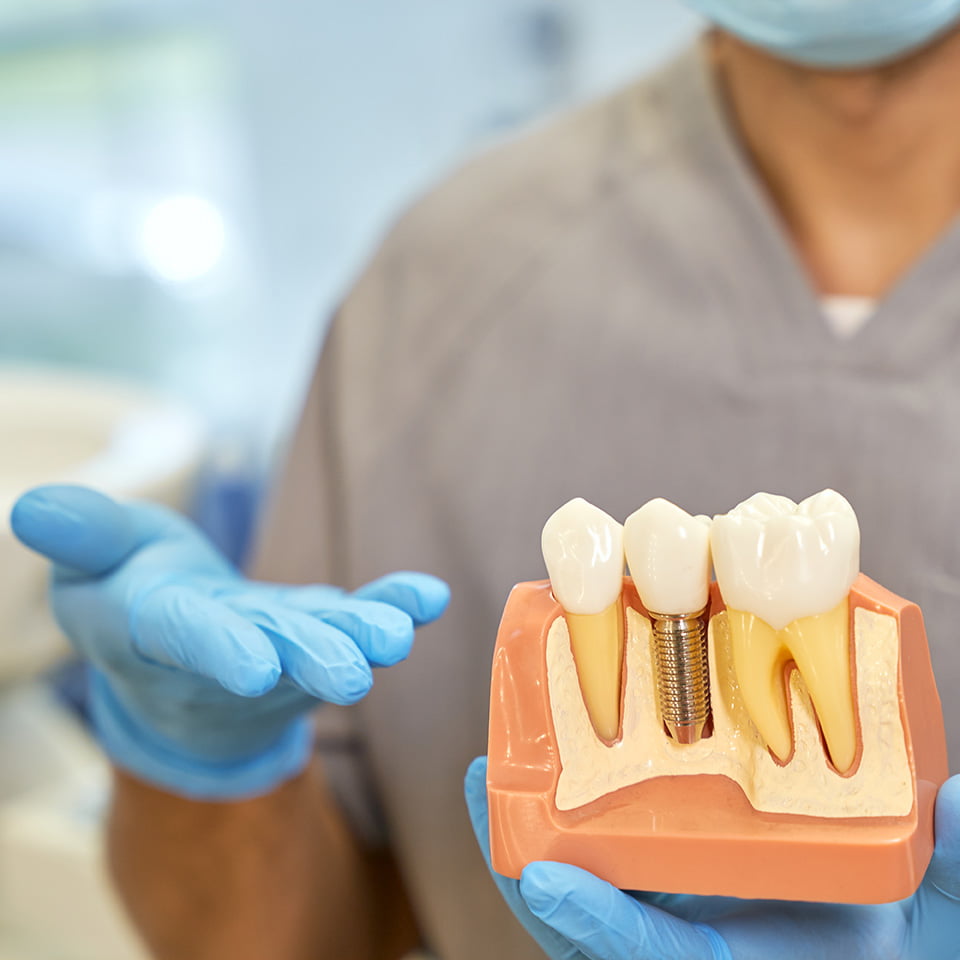
What Is The Best Way To Pay For Dental Implants?
The Financial Challenge of Dental Implants Despite their unparalleled advantages, the journey towards obtaining dental

The issue of missing teeth extends far beyond superficial aesthetics. The voids left behind can set off a domino effect of dental complications, some of which can profoundly impact one’s overall health. These complications aren’t limited to but include challenges in fundamental oral functions, speech impediments, and a restricted diet due to chewing difficulties.
Perhaps the most insidious consequence is the progressive bone loss in the jaw, often unnoticed until it precipitates noticeable facial structure changes and further tooth instability. Addressing missing teeth is thus not a vanity project but a health imperative, crucial for maintaining robust oral hygiene, nutritional health, and an uncompromised quality of life.
Dental implants stand out in the realm of restorative dentistry, offering an unmatched blend of stability and aesthetic appeal. These surgically inserted fixtures integrate with the jawbone, serving as sturdy anchors for mounting replacement teeth or bridges, thereby resurrecting the patient’s natural smile without the common hassles associated with dentures.
What sets dental implants apart is their unique ability to fuse with the jawbone, mimicking the natural tooth roots’ stimulation. This fusion is crucial in thwarting the bone loss that inevitably follows tooth loss. With dental implants, patients can enjoy permanent fixtures that seamlessly blend with their natural teeth and restore their ability to eat and speak comfortably.
Dental implants meticulously replicate the look and feel of natural teeth, primarily because they’re designed to fuse with the bone, establishing a permanent base. This integration not only ensures they stay securely in place but also contributes to a natural facial structure, eliminating any insecurities associated with missing teeth. Patients can smile freely, enhancing not only their appearance but also their self-esteem.
One of the most transformative benefits of dental implants is the restoration of full chewing functionality. They replicate the biting force of natural teeth, allowing individuals to enjoy their favorite foods without reservation and without experiencing discomfort. Moreover, dental implants stabilize the oral structure, aiding in clearer speech, and resolving the issues often associated with missing teeth or ill-fitting dentures that can cause slurring or mumbling.
Tooth loss triggers a process known as bone resorption, where the jawbone begins to deteriorate due to lack of stimulation. Dental implants are uniquely capable of halting this process. They’re the only tooth replacement option that directly fuses with the jawbone, providing the necessary stimulation to promote bone growth and maintain bone density. This benefit is crucial in preserving the overall facial structure and preventing further dental complications.
Dental implants are a testament to the advancements in dental materials and technology, offering an unparalleled lifespan. With diligent oral hygiene and regular dental check-ups, dental implants can serve as a lifelong solution. This level of durability stands in stark contrast to traditional dentures or bridges, which require frequent adjustments or replacements.
Endosteal implants are the most widely used type of dental implants and are considered the standard in implant dentistry. These implants are placed directly into the jawbone and act as an artificial root for the new tooth, providing a stable and long-lasting foundation.
Subperiosteal implants are a viable option for patients who have a shallow jawbone that cannot support endosteal implants. They are placed under the gum but on, or above, the jawbone.
Zygomatic implants are the least common type and are used in specialized cases where the jawbone cannot support traditional implants. These implants are anchored in the cheekbone rather than the jawbone.
Mini dental implants are smaller in size compared to traditional implants, making them suitable for tighter spaces or patients seeking a less invasive procedure.
From consultation to the final placement, the dental implant process is thorough and tailored to each patient’s specific needs.
The first step involves a comprehensive dental examination, including dental x-rays and a review of your medical history.
Under local anesthesia, the dental implant, made of titanium, is placed into the jawbone.
This is the period where the bone grows around the implant, securing it in place. It can take several months, but it ensures the implant is stable and durable.
Once the implant is secure, an abutment is placed on the implant, and then the custom crown, which is the visible part of the tooth, is attached.
To ensure the longevity of your dental implants, proper care is essential.
Regular brushing, flossing, and using an antimicrobial mouthwash can keep your implants and natural teeth healthy.
Routine visits to your dentist ensure that your implants are in good condition and help in early detection of any potential issues.
Most patients report minimal discomfort during the procedure, often less than a tooth extraction. Any pain post-surgery can be managed with over-the-counter pain relievers.
With proper care, dental implants can last a lifetime. However, the crown might need replacement after 10-15 years due to wear and tear.
Most people who are in good health are suitable candidates for dental implants. However, certain conditions and diseases can affect whether dental implants are right for you.
The cost varies depending on several factors, including the type of implant and where you live. It’s best to consult with your dentist for a precise estimate.
Dental implants offer a revolutionary solution for those with missing or damaged teeth. They not only restore the functionality of natural teeth but also boost confidence with a natural smile. If you’re considering dental implants, we encourage you to consult with a specialist in implant dentistry, like Dentistry by Dr. Kaplansky, to get personalized advice and care. Your journey to a brighter, healthier smile is just a consultation away!

The Financial Challenge of Dental Implants Despite their unparalleled advantages, the journey towards obtaining dental

Dental implants have revolutionized the world of dentistry, offering a long-term solution for missing or

The Undeniable Necessity of Replacing Missing Teeth Beyond Cosmetic Concerns The issue of missing teeth
At Dentistry by Dr. Kaplansky, we believe that everyone deserves quality dental care, regardless of their situation. Our experienced team specializes in a variety of services such as dentures, crowns, bridges, implants, and anything else needed to ensure your smile is healthy and beautiful! Our patients are the most important thing to us. That’s why we offer the best service in Gasport, Lockport, Buffalo, and the rest of New York!
With us, you can feel at ease knowing that not only will we meet all your expectations, but we will also provide specialized care tailored to fit each individual’s needs. Additionally, our knowledgeable staff makes sure that all treatments are performed with the utmost safety and precision in order to minimize any discomfort or risks during treatment.
Call or visit our website today to book an appointment with Dentistry by Dr. Kaplansky and get the dental health you deserve!
2023 All Rights Reserved | Dentistry by Dr. Kaplansky, PLLC | Powered by Starfish Ad Age